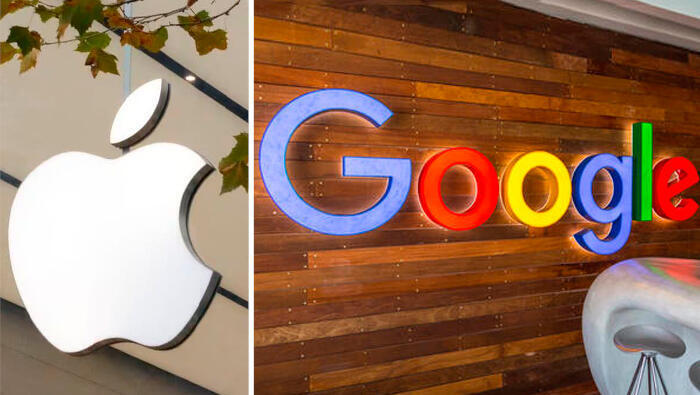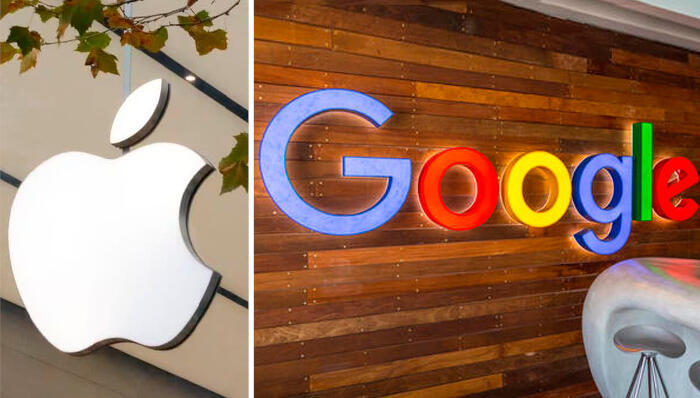
Analysis
Is the Google-Apple AI deal a game changer?
According to Bloomberg, Apple is holding negotiations to integrate Google's artificial intelligence engine into its iPhones; the deal could make Google one of the clear winners in the AI race, and will improve Apple's capabilities in the field
The most talked about regulatory event of 2023 was undoubtedly the antitrust trial conducted by the US Department of Justice against Google. At the heart of the trial, which took place for the most part during October and November, was the claim that Google had signed anti-competitive deals with various technology companies to provide preferred status to its search engine - which has harmed the ability of other players in the field to compete with it. One of the deals in question that emerged in the trial was with Apple, in which Google paid the company $18 billion in 2021 alone, to make Google Search the default on the iPhone.
The verdict in the trial has not yet been delivered, but it seems that the giants did not learn anything from it. According to a report by Bloomberg, Apple and Google are in talks to integrate Gemini, Google's generative artificial intelligence engine into the iPhone. According to sources, the goal is to use Gemini as the engine behind various GenAI capabilities that Apple plans to reveal at its June developer conference, and to launch broadly in early fall.
Such a deal, if it goes through, could shape and define the burgeoning GenAI industry, making Google one of its clear winners while the race is still in its early stages. Younger players, who are just starting to gather steam, may as a result be left out of the race altogether, meaning that the monolith of the online search field will also be replicated in the field of generative artificial intelligence.
The talks are still ongoing, and an official announcement of a deal will probably not be made before Apple's developer conference in June. In addition, according to Bloomberg, the deal may not come to fruition at all, and Apple could enter into a partnership with another player such as OpenAI, with which the company has also held talks, or even with several other players.
The GenAI breakthrough about two years ago caught Apple off guard. The company did develop various artificial intelligence solutions, but it hardly dealt in this specific field. The introduction of large language models and chatbots based on LLMs, and their clear implications for the mobile market (for example, in photo editing or upgrading smart assistants such as Siri), caught Apple off-guard compared to companies that have been engaged in research in this field for years, such as Google, or have close collaborations with leading players, such as Microsoft with OpenAI.
Apple hastened to direct considerable resources to develop capabilities in the field. The move included closing its automotive development division to direct software engineers to its AI division and making key acquisitions. Last week, for example, Apple acquired a Canadian AI startup DarwinAI that helps make AI systems smaller and faster. And according to reports, the company's engineers and researchers also managed to register some significant breakthroughs that will help Apple reduce gaps in the field. But the gaps still exist, and in order to remain relevant and present an appropriate response in the immediate term, the company needs collaborations with other players in the field. This need was highlighted especially in light of the fact that its rival Samsung has already positioning itself as a leader in the mobile AI field, launching at the beginning of the year what it called "the first AI smartphone", the Galaxy S24.
Google, as one of the leading players in the field, is a natural partner in this move. Ostensibly it is a rivalry - Google's Android competes with the iPhone and the companies have also fought legally and publicly over control of the smartphone field - but in practice the companies have a deep, long-standing and ultimately very profitable partnership around mobile search (profitable for Apple in the form of the billions that Google pays, and for Google in the form of the revenues that it generates from searches on iPhones).
A similar deal around GenAI serves the interests of both parties. Apple will get immediate access to capabilities that it will take a long time to develop on its own, and will be able to position itself as a leader in the field while it builds its independent capabilities. Google, which at least in terms of image is considered second to OpenAI in the field, will get access to the most important computing platform in the world. This approach will not only bring its engine to billions of users but also allow it to use them to enrich and improve its models.
According to Bloomberg, in the next version of the iPhone operating system, iOS 18, which will be presented in June, Apple is expected to integrate artificial intelligence capabilities based on its own model. However, these will be based mainly on models that work on the device itself (a traditional Apple approach, designed to improve user privacy by preventing information from being sent to the cloud). However, advanced GenAI models are too complex to run in a local environment. Apple does develop its own LLM model called Ajax, but according to sources its capabilities are inferior compared to the Google and OpenAI models. Therefore, Apple needs a partner like Google in order to offer iPhone users capabilities such as text to picture or chatbots.
Related articles:
If they do sign a deal, it is likely to be subject to significant regulatory scrutiny in the U.S. and even more so in the European Union, which will seek to ensure that the cooperation between the two technology giants does not hinder competition in the field. The understandable fear is that by cooperating with Google, Apple will in fact close the door to other, smaller companies, and they will be denied an opportunity to ride the iPhone's massive platform and gain access to information that will significantly upgrade their operations and allow them to produce significant alternatives to Gemini and OpenAI's GPT. This, similar to what happened following the search deal between Apple and Google. Following the trial that took place last fall, and the possible blow that Google will receive from the court, one cannot help but wonder: have the two companies not learned the lessons of the past?
The answer is that they learned these lessons well, and apply them in the present. The collaboration between Google and Apple on the iPhone has existed since the first model of the device, somewhere in 2007. Then, in fact, it was even deeper than today: Google's CEO at the time, Eric Schmidt (who a year earlier had been appointed to Apple's board of directors), joined Steve Jobs on stage at the launch of the device and even congratulated him on the significant achievement. When the first model went on the market, It included Google Maps and YouTube as built-in applications.
The launch of Android later in 2007 disrupted the partnership between the companies, and even turned it into a bitter rivalry at times, but at the same time Google continued to pay Apple considerable sums to be the default search engine. Google may have even benefited more than Apple as early dominance on the iPhone stifled the possibility of other players creating an alternative mobile search experience that would have the potential to gain widespread adoption. Apple made billions effortlessly, Google expanded its search hegemony and took over a new platform, and for nearly a decade and a half no regulator cared enough to do anything about it.
Only in 2020, 13 years after the start of this collaboration, the US Department of Justice woke up and filed a lawsuit against Google. Another three years passed until the trial itself. The verdict has not yet been given, and even when it is given, more years of appeals and discussions are expected before a final decision is made. And when it comes? It is likely that search as we know it today will no longer be relevant, and any financial fine that Google receives will be nothing compared to the revenue that the deal with Apple generated for it for nearly two decades.
Google and Apple are counting on, one can assume, a similar scenario around the AI deal. It will take time for the regulators to motivate themselves to take significant action, and even if they react faster than they did to the search deal, the companies will be able to drag out, disrupt and slow down the processes for several years. And in the meantime, Google will consolidate its dominance, Apple will improve its capabilities, and until something happens with the regulatory moves, the deal itself will no longer be relevant, any significant competition will be eliminated, and the companies will move on to the next field.
